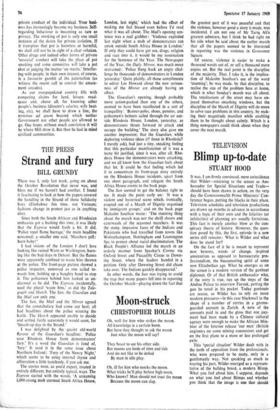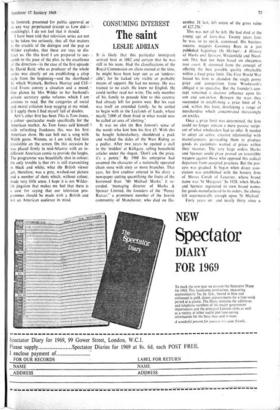Blimp up-to-date
TELEVISION STUART HOOD
It was, I am firmly convinced, mere coincidence that Wilder—returning to the screen as Am- bassador for Special Situations and Trade— should have been shown in action, on the very day the Commonwealth Prime Ministers' Con- ference began, putting the blacks in their place. Television schedules and television productions are drawn up months in advance in accordance with a logic of their own and the felicities (or infelicities) of planning are usually fortuitous. This fact is merely another blow at the con- spiracy theory of history. However, the ques- tion posed by this, the first, episode in a new series still remains: What is Wilder and what does he stand for?
On the face of it he is meant to represent new brooms, winds of change, inspired amateurism as opposed to bureaucratic pro- fessionalism, the buccaneering spirit of some new Elizabethan age. What he emerges as on the screen is a modern version of the gunboat diplomat. Or of that British ambassador who, if the story is true, ran up the steps of the Abdine Palace to interview Farouk, patting the gun he toted in his pocket. Today gunboats are scarce, so Wilder has to rely on more modern pressures—in this case blackmail in the shape of a number of entries in a gnome- guarded account in Zurich. A note of the amounts paid in and the gloss that one pay- ment had been made by a Chinese cultural agency were enough to make the African Min- ister of the Interior release 'our men' (British engineers on some mining concession) and get on the first plane to a more or less prolonged - exile.
This 'special situation' Wilder dealt with in the teeth of opposition from the professionals, who were prepared to be nasty, only in a gentlemanly way. Not speaking so much as roaring his part, Wilder emerged as a represen- tative of the bulldog breed, a modern Blimp. What you feel about him, I suppose, depends on what you feel about Blimps and whether – you think that the image is one that should -
be fostered, presented for public approval or in any way perpetuated ,(except as Low did— mockingly). I do not feel that it should.
I have been told that television series are not to be .taken too seriously, that all that matters is the crackle of the dialogue and the pop as Wilder explodes, that these are toys to dis- • tract us. On this level I am prepared to suc- cumb to the pace of the plot, to the excellence of the direction—in the case of the first episode by David Reid. who as producer of the whole• series was clearly set on establishing a crisp style from the beginning,--and the shorthand,c by which Wymark, Barbara Murray and Clif-sE' ford Evans convey a situation and a mood., One glance ,by Mrs Wilder to her husband's private secretary spoke volumes which I am anxious to read. But the categories of social and moral criticism keep nagging at my mind. If I apply them I find myself full of doubts.
A-rv's other first has been This is Tom Jones, ' a colour spectacular made specifically for the American market. As Tom Jones said himself 1, with refreshing frankness this was his first American show. He can belt out a song with Welsh gusto. Women, so I am told, find him irresistible on the. screen. On this occasion he was placed firmly in mid-Atlantic with an in- different American comic to provide the laughs. The programme was beautifully shot in colour; the only trouble is that rry is still transmitting in black and white; what die British viewer got, therefore, was a grey, washed-out picture and a number of shots which, without colour, made very little sense. I hope it is not Wilder- ish jingoism that makes me feel that there is a case for saying that our television pro- grammes should be made with a British and not an American audience in mind.



































 Previous page
Previous page